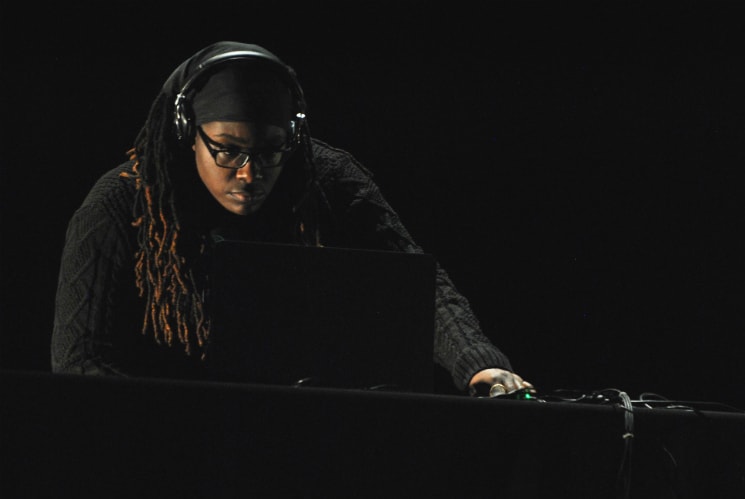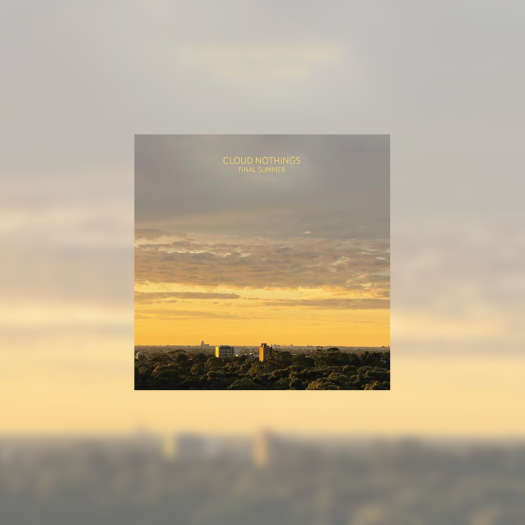Unsound's first two Toronto touchdowns transformed the city's massive decommissioned Hearn power plant into a sprawling industrial cathedral of drone's most apocalyptic voices. When the Kraków, Poland festival returned for the first of two Halloween-themed nights at the seated Bluma Appel Theatre (this one was "Halloween High," it swivelled its focus to the skeletal architecture of the human experience, reimagining the social and the personal with dramatic flips and contortions.
Three years out from its theatrical release, any chance to catch Jonathan Glazer's Under the Skin on the big screen is welcome, but the allure of this presentation was further augmented by a live, string-heavy ensemble that brought Mica Levi's score into the foreground. Masked as it is by Glazer's ambient depiction of Scarlett Johansson's human-disguised alien temptress cruising Scotland for prey in a murder van, Levi's soundtrack is the pendulum key to the protagonist's interior self, from the hollow clock that accompanies the routine cultivation of unsuspecting punters for the void to the warmer synths chaperoning genuine attempts at human affection.
While Glazer's film and its hidden cameras attempt a mechanical reversal of the male gaze, Levi's score works to translate alien feelings. It's complicated and unsettling work, and there's more than novelty to be taken away from its live dub, the physicality of the instrumentation happening before the audience adding subtle nuance and drama to the action onscreen, the visual cue of every lifted bow accumulating tension as each repeated string motif approached, lingered and attacked with the same casual indifference of Johansson's character, abrupt cymbal strikes dashing ink-doomed victims into flaccid husks of male fragility.
Having contemporary dance choreographer Wayne McGregor's Autobiography Edits (a pared-down version of the original work) follow the live score was a brilliant and complementary stroke of programming. In his practice, McGregor has increasingly incorporated scientific and artistic fields into his approach. Autobiography is described as a "meditation on aspects of self, life, writing, refracting both remembered pasts and speculative futures."
None of those influences are represented literally in the action of Autobiography, but they're catalysts that figure high in the concept, a score of dancers acting on a randomly selected variation of 23 choreographies (one for each pair of chromosomes containing the human genome) for every iteration of the performance, all set to a soundtrack provided by Jlin (pictured above).
Despite a growing catalogue that defies it, Jlin has consistently endured categorization and essentialist narratives of her work. Boilerplate press copy routinely ties the Gary, Indiana producer to Chicago's footwork scene, but if she references the genre in her recordings, she's taking it to haunting new places, often breaking entirely free to explore deeper, wider atmospheres live.
Autobiography is yet another showcase of her flexibility, emphasized by a more physical but equally elemental display of social energy, breaking from the gait of modern life in frantic, athletic bursts of battle dance and rhythmic hypnosis, no two moves the same, choreographer, dancers and musician alike asserting themselves in different gesticulations. They vaulted off one another in kinetic displays, interacting as cells and environment as often as dance partners — a parkour of the life-world and a radical illustration of the implicit freedom of human expression.
Three years out from its theatrical release, any chance to catch Jonathan Glazer's Under the Skin on the big screen is welcome, but the allure of this presentation was further augmented by a live, string-heavy ensemble that brought Mica Levi's score into the foreground. Masked as it is by Glazer's ambient depiction of Scarlett Johansson's human-disguised alien temptress cruising Scotland for prey in a murder van, Levi's soundtrack is the pendulum key to the protagonist's interior self, from the hollow clock that accompanies the routine cultivation of unsuspecting punters for the void to the warmer synths chaperoning genuine attempts at human affection.
While Glazer's film and its hidden cameras attempt a mechanical reversal of the male gaze, Levi's score works to translate alien feelings. It's complicated and unsettling work, and there's more than novelty to be taken away from its live dub, the physicality of the instrumentation happening before the audience adding subtle nuance and drama to the action onscreen, the visual cue of every lifted bow accumulating tension as each repeated string motif approached, lingered and attacked with the same casual indifference of Johansson's character, abrupt cymbal strikes dashing ink-doomed victims into flaccid husks of male fragility.
Having contemporary dance choreographer Wayne McGregor's Autobiography Edits (a pared-down version of the original work) follow the live score was a brilliant and complementary stroke of programming. In his practice, McGregor has increasingly incorporated scientific and artistic fields into his approach. Autobiography is described as a "meditation on aspects of self, life, writing, refracting both remembered pasts and speculative futures."
None of those influences are represented literally in the action of Autobiography, but they're catalysts that figure high in the concept, a score of dancers acting on a randomly selected variation of 23 choreographies (one for each pair of chromosomes containing the human genome) for every iteration of the performance, all set to a soundtrack provided by Jlin (pictured above).
Despite a growing catalogue that defies it, Jlin has consistently endured categorization and essentialist narratives of her work. Boilerplate press copy routinely ties the Gary, Indiana producer to Chicago's footwork scene, but if she references the genre in her recordings, she's taking it to haunting new places, often breaking entirely free to explore deeper, wider atmospheres live.
Autobiography is yet another showcase of her flexibility, emphasized by a more physical but equally elemental display of social energy, breaking from the gait of modern life in frantic, athletic bursts of battle dance and rhythmic hypnosis, no two moves the same, choreographer, dancers and musician alike asserting themselves in different gesticulations. They vaulted off one another in kinetic displays, interacting as cells and environment as often as dance partners — a parkour of the life-world and a radical illustration of the implicit freedom of human expression.




